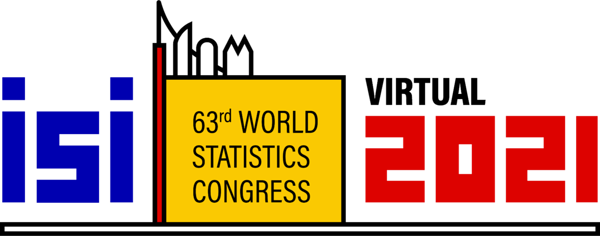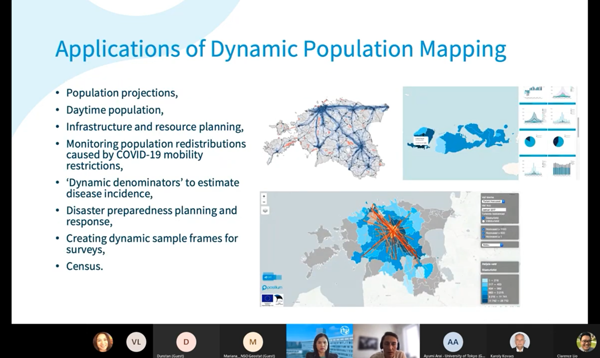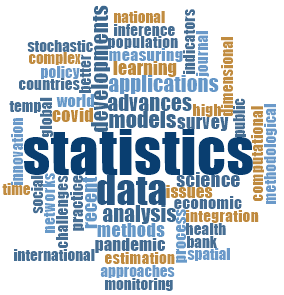The WSC is held by the International Statistical Institute and takes place every other year. Previously, in 2019, the WSC took place in Kuala Lumpur, Malaysia, and in 2021 it was supposed to move to The Hague in the Netherlands. Unfortunately, due to the COVID-19 pandemic, it was decided that the 63rd WSC was to be held online. It is difficult to substitute the immediacy of having a physical conference. Interactivity and networking suffered somewhat with the online format but nevertheless, it created an opportunity for the most inclusive conference so far.
The theme of the congress was “Statistics and Data Science for a Better World”, which highlighted the developments and contributions of statistics and data science in all aspects of life. Positium was represented at the congress in three invited paper sessions about mobile data by the CEO, Mr. Erki Saluveer, and Head of Sales, Mr. Siim Esko. The conference programme featured hundreds of sessions to choose from. Our members of staff were able to join several of them and heard many interesting points raised by the distinguished panellists. Here are our takeaways from the congress.
Better statistics are critical for combating the pandemic
As Queen Máxima of the Netherlands also stated, the importance of good-quality, timely, and granular data has never been as clear as during the COVID-19 crisis. Such data is critical in understanding, managing and mitigating the human, social and economic effects of the pandemic. For example, Statistics Estonia together with mobile network operators analysed mobile data to compare people’s mobility before and after the COVID-19 crisis showing that around 200 000 more people have been staying in their main location.
Big data revolution is here to stay
The session covering the topic “Official Statistics in the Changing World of Data Science” (IPS 231) discussed how the data science revolution has brought about positive changes to official statistics in terms of coverage, speed, and cost-efficiency, among others. Technological advances powering big data innovation have the potential to help meet the growing demand for statistics at the local, national and international level. However, experts also warned that some of the key challenges regarding digital change are especially related to data collection, data quality and protection of data privacy. In addition, national statistical offices also need to build a data culture within their organisations by investing in capacity-building programs.
MPD continues to be widely adopted
With more than five billion active users, mobile positioning data (MPD) continues to be a leading source of big data innovation that can complement traditional data sources. Our Head of Sales, Siim Esko, summarised in his presentation that, since the population is more dynamic than ever before, new data sources for monitoring population figures are needed. One way for mapping the dynamic population is using the data that is gathered by mobile network operators.
Different ways how mobile phone data can be used for Dynamic Population Mapping. Examples from the field of statistics, planning, governing domains as the result of the work of the Committee of Experts on Data Science and Big Data for Official Statistics. Source: Positium
In another session, Positium’s CEO Erki Saluveer explained how SDG indicators were calculated using MPD. MPD provides the perfect dataset for measuring mobile phone use and access. In the tourism industry, technological developments involving big data allow transformation and rapid innovation in tourism, using MPD helps to improve the decision-making process and predictive analyses, but it also improves the accuracy of tourism statistics. It also has the potential to complement and fill the current gaps in official statistics that result from traditional measurement methods (e.g. censuses and surveys).
The need for more granular data
Data is a powerful tool in public debate and political decision-making. To fight inequalities and achieve the pledge of the 2030 Agenda for Sustainable Development “to leave no one behind”, we need more granular and complex data disaggregated by income, gender, geographical location, and other factors. The role of the statistical community is to set standards for collecting, analysing, publishing and using these data categories.
Using new methods for collecting data alongside traditional methods can also empower citizens and communities and even provide insights in real-time. Another great impact story was displayed in the Setomaa Tourism case study, which shows how MPD provided insights for local tourism marketing. The local tourism agency found great value in the MPD-based tourism flows as they showed the movements of visitors and helped the local tourism agency to coordinate further activities in direct marketing and collaborate with different regions.
Data origami for a better world
Finally, Prof Kerrie Mengersen, the ISI President’s Invited Speaker for this year’s event, likened statistics to origami, the art of paper folding. One starts with data (the other one with paper), afterwards we can add a base or a framework, think about a model (i.e. a variation), and start analysing the data (i.e. folding the paper). Both cases create a product which serves some purpose. However, different paper bases can lead to different outcomes and the same goes for data which can be used in many ways for benefitting society.
Word cloud based on the session titles of WSC 2021. Source: Positium
Our analysis of the keywords used in the session titles of the 63rd ISI World Statistics Congress shows how the statistical community is constantly dealing with the different components that turn data into origami. From exploring different data sources to developing new statistical methods, models, and approaches in different areas of life. All with a single goal to give data a meaningful purpose of measuring human progress towards creating a better and equal world for everyone.
We were excited to be a part of this excellent event and hope to see everyone again in the next ISI World Statistics Congress in Ottawa, Canada in 2023.
.png)


